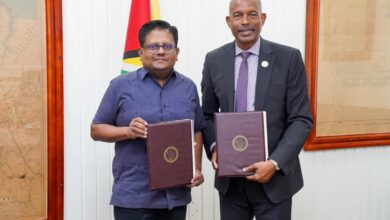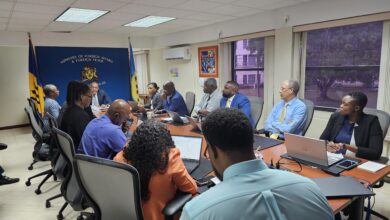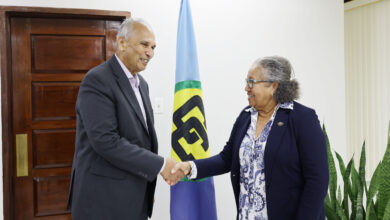The Caribbean Community (CARICOM) Ministers responsible for Trade and Economic Development have agreed to a CARICOM position on Agriculture and Services in the current round of negotiations taking place in the World Trade Organisation (WTO).
Assistant Secretary-General for Regional Trade and Economic Integration at the CARICOM Secretariat, Byron Blake, reporting on the CARICOM initiative, explained that the Ministers also agreed to place high priority on the development of the Caribbean rice industry and the establishment of an independent Standards Institution, which will represent the Region in international standards negotiations and forums, as well as take the lead in setting regional standards for specific products such as rice, brewing and bottling, and matches.
Mr. Blake said the Region is preparing to compete in a world market economy in which traditional market access for Caribbean goods and services are being eroded and reciprocity is being demanded on all sides.
The Ministerial deliberations took place at the Tenth Meeting of the Council for Trade and Economic Development (COTED), which was convened in Georgetown, Guyana, 11-12 January, 2001.
“The decisions of this meeting represent another step by the Region to better equip itself to compete in a world economy driven by market forces of trade liberalisation and globalisation,” noted the Assistant Secretary-General of CARICOM..
COTED is responsible for the promotion of trade and economic development within the Community. It is one of four Ministerial Organs of CARICOM, and it oversees the operations of the CARICOM Single Market and Economy (CSME).
The COTED also approved the recommendations from the Second Special Consultation between CARICOM and the Civil Society leadership on the CSME which was convened in Barbados last November .
The Community Organ placed priority on the institutional arrangements at the national and regional levels to push forward the public education programme as well as the implementation of the free movement of persons, and the establishment of programmes under Protocol II for the removal of restrictions to intra-regional trade in goods and services, the movement of Capital and the Right to Establish Business in the Region.
Another important development resulting from the COTED deliberations was agreement by the Ministers to work towards developing a strategy to ensure the faithful implementation of the Cotonou Agreement and the EU “Everything But Arms Initiative”. This followed an extensive review of the implications of the Agreement by the COTED.
The Ministers paid special attention to the new proposals of the European Union to settle the longstanding dispute over the Banana Import Regime. They strongly opposed the approach taken by the EU Agriculture Council and issued a statement conveying that the Caribbean cannot accept such a system that does not ensure continued access to the EU market on an economically viable basis.
The COTED also addressed the finalisation of the implementation of the Cuba/CARICOM Trade and Economic Cooperation, and the Protocol on intra-regional trade in goods among Member States. The Ministers also examined the operation of the Common External Tariff (CET), the Rules of Origin, the removal of restrictions and the establishment of Standards, as well as the preparations for the upcoming Trade Ministerial Meeting on the Free Trade Area of the Americas.
Mr. Blake also pointed to the new issues which engaged the attention of the Community Organ. They relate to intellectual property, e-commerce and government procurement.
He reported that the Ministers agreed to a coordinated approach to bilateral, regional, hemispheric and multilateral arrangements in these areas.





